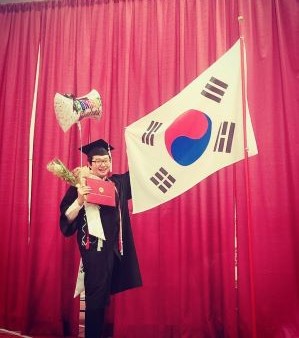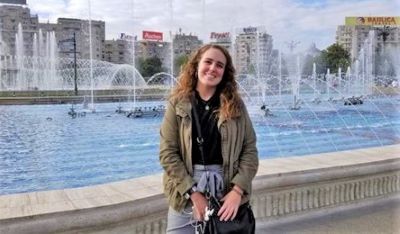TESOL Major - Liberal Arts
36-38 Total Credits
Foreign Language Requirement
Candidates must have demonstrated proficiency in language study of a single foreign language, which can occur through two years of high school study, four semesters of university study, or other equivalent means of demonstrating proficiency in foreign language study. This foundation requirement is not included in the number of credit hours needed for the major proper: the foundation requirement of two years of foreign language study is separate from the Directed Electives.
Required Courses 24 cr. hrs.
ENGL 211 Intro to TESOL: Reading and Writing. 3 cr.
ENGL 220 Structure of English 3 cr.
ENGL 322 Acquisition of Language 3 cr.
ENGL 360 Theory and Methodology of TESOL 3 cr.
ENGL 373 Techniques in Tutoring: TESOL Practicum 3 cr.
ENGL 420 Pedagogical Grammar 3 cr.
ENGL 351 Phonetics and Phonology 3 cr.
ENGL 475 Assessment and Testing in TESOL 3 cr.
Directed Electives 12-14 cr. hrs.
This requirement can be fulfilled through a combination of language study, study abroad, and courses listed in section 5 below or through courses selected from section 5 alone. Appropriate study abroad programs would include those with whom UWRF has associations, such as The Hessen Exchange in Germany, Wisconsin in Scotland, Wisconsin in China, and University of Guadalajara in Mexico. TESOL/MODL (German, Spanish, for examples) double majors may fulfill the directed electives with 12 credits chosen from the MODL courses listed in section 5 below.
Select among:
1. Language Option 0-8 cr. hrs.
Select 0-8 credits from among 201, 202, 301, 302, and 401 from one of the following languages: Chinese, German, Japanese, or Spanish. (Students cannot double-count courses taken to satisfy the foundation language requirement above for this directed electives category.)
2. Semester Abroad Research 0-6 cr. hrs.
A TESOL-based ENGL 378 or any department's 378, that is based in the discipline of TESOL and has an advisor or co-advisor from TESOL may be used to fulfill this requirement with prior approval. Requires department approval and may be added to a student’s DAR by program exception signed by the chair of the Department of English.
3. Semester Abroad 0-6 cr. hrs.
INTS 377 Semester Abroad: Europe
Credits earned in Semester Abroad or the International Traveling Classroom could be used to meet this requirement. Courses other than INTS 377 need to be approved prior to engaging in the experience as appropriate to the TESOL major by the chair of the Department of English and may appear in this category on the DAR by program exception form signed by the chair.
4. Select up to two of the following courses 0-6 cr. hrs.
ENGL 379 Cooperative Education and Internship II 3 cr.
MODL 376 Mexico: A Cultural Experience 3 cr.
HIST 371 Study Tour Research: China or Italy 3 cr.
5. Select from the following courses to fulfill the Directed Electives component 0-12 cr. hrs.
ENGL 230 International Short Fiction 3 cr.
ENGL 232 Contemporary Drama 3 cr.
ENGL 306 Postcolonial Film and Literature 3 cr.
ENGL 317 East Asian Film and Literature 3 cr.
ENGL 441 20th Century International Fiction 3 cr.
ENGL 442 World Cinema 3 cr.
ENGL 450 Non-Native Speakers of the Midwest 3 cr.
GERM 315 Classic and Modern German Film 3 cr.
GERM 352 Survey of German Literature II 3 cr.
SPAN 341 Spanish Civilization to 1800 3 cr.
SPAN 342 Spanish Civilization 1800 to Present 3 cr.
SPAN 345 Latin American Civilization to 1800 3 cr.
SPAN 346 Latin American Civilization 3 cr.
SPAN 350 Spanish Phonetics 3 cr.
SPAN 351 Survey of Spanish Literature I 3 cr.
SPAN 352 Survey of Spanish Literature II 3 cr.
SPAN 355 Survey of Latin American Literature I 3 cr.
SPAN 356 Survey of Latin American Literature II 3 cr.
SPAN 371 Business and Culture in the Hispanic World 3 cr.
SPAN 372 Spanish for the Trades and Profession 3 cr.
SPAN 452 Advanced Spanish Literature 3 cr.
SPAN 455 Advanced Latin American Literature 3 cr.
COMS 213 Intercultural Communication 3 cr.
ECON 312 Political Economy of Discrimination 3 cr.
GEOG 342 Latin America 3 cr.
GEOG 343 Africa 3 cr.
GEOG 344 Asian and Oceana 3 cr.
HIST 201 Introduction to Asian Civilization 3 cr.
HIST 202 Introduction to Latin American Civilization 3 cr.
HIST 204 United States Immigration and Ethnic History 3 cr.
HIST 209 Introduction to African History 3 cr.
HIST 333 Silk, Spices, and Silver: The Making of the Global Exchange System to 1700 3 cr.
HIST 332 The Islamic Middle East to 1500 3 cr.
HIST 334 Modern China 1800 to Present 3 cr.
HIST 335 Modern Japan 1600 to Present 3 cr.
HIST 336 Traditional East Asia, Prehistory to 1800 3 cr.
HIST 349 Middle Eastern History and Politics 3 cr.
PHIL 245 Eastern Religions and Islam 3 cr.
SOCI 220 Sociology of Diversity 3 cr.
ANTH 231 / SOCI 231 Sociology of Globalization 3 cr.
ANTH 314 / SOCI 314 Faces of Culture 3 cr.
ANTH 322 / SOC 322 Race and Ethnicity 3 cr.
ANTH 331 / SOCI 331 Global Perspectives on Women 3 cr.
ANTH 338 / SOCI 338 Global Perspectives on Health and Disease 3 cr.
POLS 212 The Politics of Equality and Inequality in the United States 3 cr.
POLS 260 Introduction to International Relations 3 cr.
PSYC 385 Psychology of Prejudice and Racism 3 cr.
6. Required supporting course 3 cr. hrs.
MATH 216 Elementary Statistical Concepts 3 cr.













